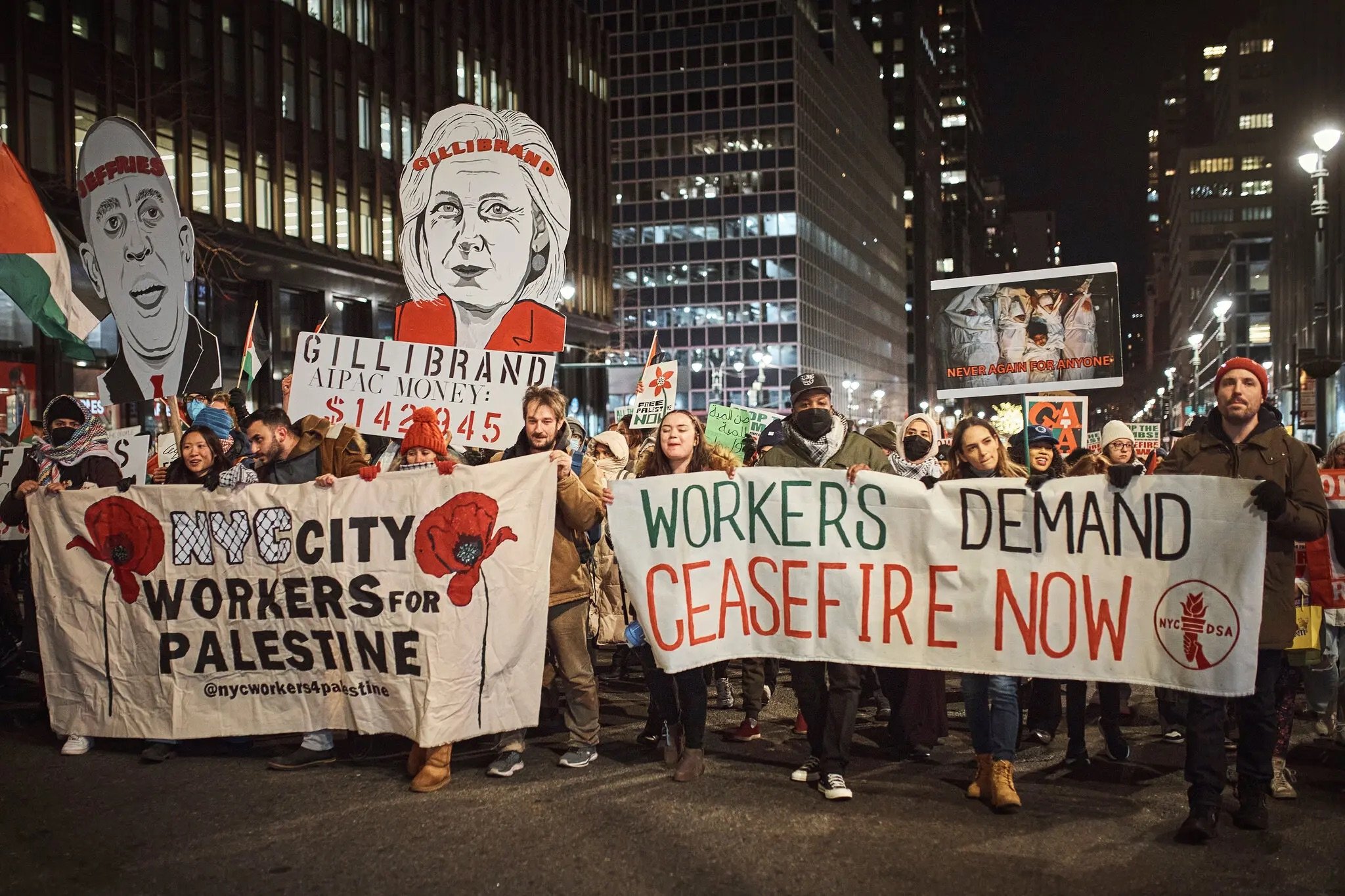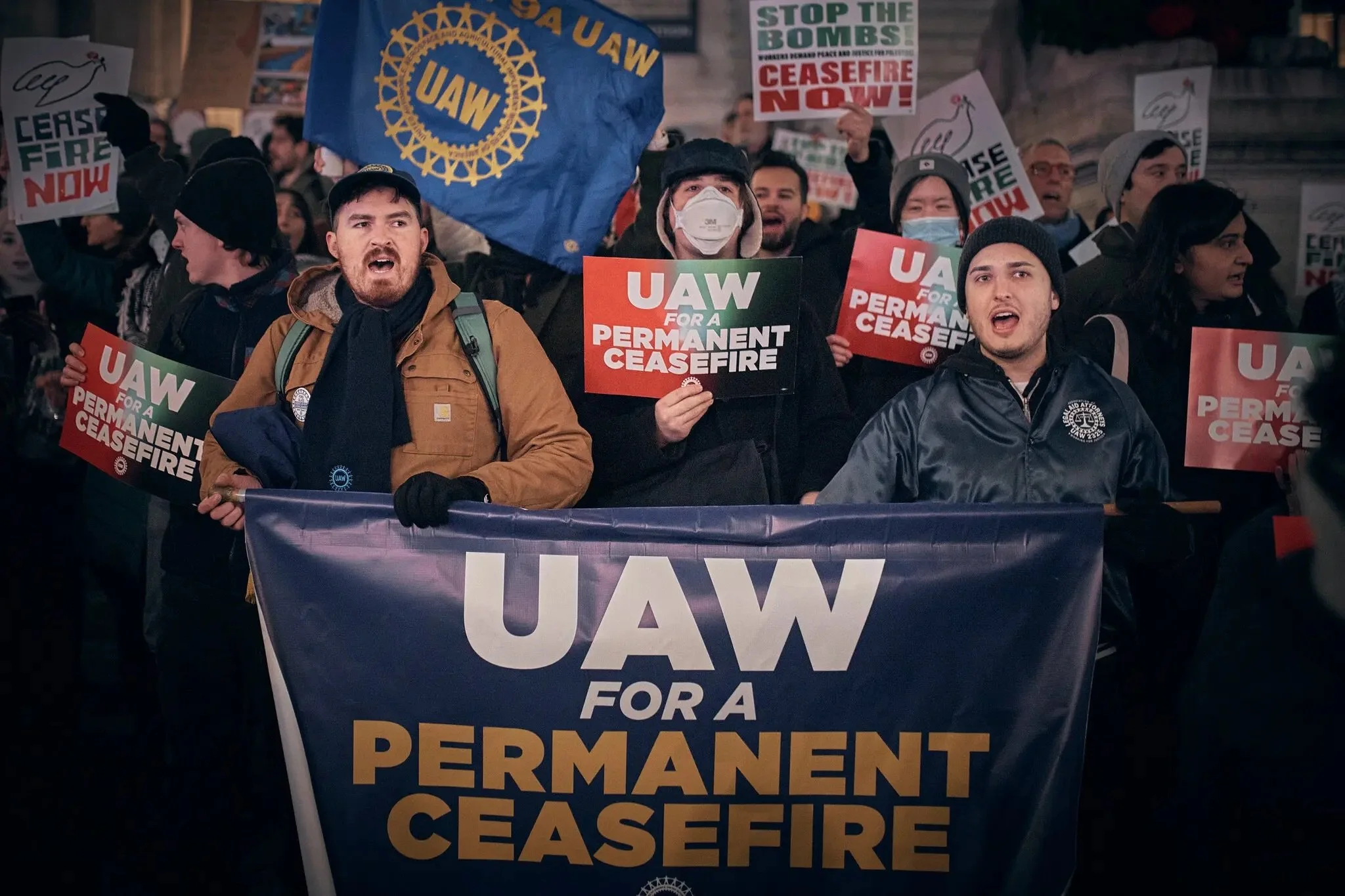American Unions Long Backed Israel. Now, Some Are Protesting It.



In December, United Automobile Workers members joined a march in Manhattan in favor of a cease-fire in Gaza.Credit...Andres Kudacki for The New York Times
The shift reflects a broader generational change, and has exposed philosophical rifts in the labor movement about what the purpose of a union ought to be.
by Emma Goldberg and Santul Nerkar
“Why are we here?” said Brandon Mancilla, a leader with the United Automobile Workers. Mr. Mancilla faced a crowd of hundreds of union members gathered on the steps of the New York Public Library’s Fifth Avenue branch, huddling against the cold as they rallied for a cease-fire in Gaza.
“Cease-fire now, solidarity forever!” Mr. Mancilla, 29, said as the crowd cheered, waving union banners and Palestinian flags. “Let’s get more and more unions behind us.”
On display in that Dec. 21 protest — which came shortly after the 350,000-member U.A.W. voted to support a cease-fire — was a shift in the American labor movement’s relationship with Israel.
For decades, the most prominent American unions were largely supportive of Israel. Today, though, amid a resurgence of the American labor movement, some activists are urging their unions to call for an immediate cease-fire in Gaza and succeeding — a change that reflects a broader generational shift.
But many unions are divided over what stance to take or whether to take any stance at all.
Some American labor leaders have remained supportive of Israel’s war against Hamas, and moved swiftly to condemn Hamas’s attacks on Oct. 7. They are dismayed by the views of a younger generation of organizers who in some cases oppose Israel’s existence as a Jewish state.
“There has been a shift in society, and that’s reflected in the labor movement as it is every place else,” said Stuart Appelbaum, president of the Jewish Labor Committee and head of the Retail, Wholesale and Department Store Union.
Union Support for Israel
The American labor movement’s traditionally close relationship with Israel stems from decades of Jewish labor leaders staunchly backing the state, even before its founding. In 1917, the American Federation of Labor passed a resolution supporting the Balfour Declaration, which called for the creation of a Jewish state in Palestine, and throughout the 1920s and ’30s unions donated millions to Histadrut, Israel’s national labor union.
After Israel’s founding in 1948, American unions started investing in the country’s bond program, using money from strike and pension funds. Some also donated money to build stadiums and children’s homes in Israel. By 1994, $1 billion had been invested in those bonds by around 1,700 American trade unions, according to archival research from Jeff Schuhrke, a labor historian at Empire State University.
“In many ways, you can argue that U.S. unions helped construct the state of Israel,” Mr. Schuhrke said.
In 1980, the president of the A.F.L.-C.I.O., Lane Kirkland, declared that a Palestinian state would be “a terrorist state” and “an unmixed disaster to the United States” before hundreds of labor lawyers and union officials. In 1982, the union took out an advertisement in The New York Times declaring support for Israel in its war against Lebanon: “The A.F.L.-C.I.O. is not neutral.”
Earlier generations of the U.A.W. had backed Israel.Credit...Andres Kudacki for The New York Times
Union support for Israel sometimes bred internal tensions, with some of the union rank-and-file membership protesting the relationship. In 1949, the same year the International Ladies Garment Worker Union made a $1 million Israeli bond purchase, a group of its members asked the union to support Palestinian refugees. In 1973, thousands of Arab American auto workers in Detroit briefly walked off the job to protest the U.A.W.’s financial support of Israel. In 2002, after John J. Sweeney, then the A.F.L.-C.I.O. president, spoke at the National Rally for Israel, a group of union members circulated a petition condemning his support for the country.
Professional Consequences
Since the Israel-Gaza war broke out, debates over the fighting have exposed deeper rifts over how unions should represent their diverse membership, and how to balance political advocacy with professional ramifications.
The Writers Guild faced an outpouring of frustration from more than 300 members when the union didn’t immediately condemn Hamas’s attacks on Oct. 7. Starbucks and its union, Starbucks Workers United, are suing each other over the union’s use of company imagery in a pro-Palestinian social media post. Chris Smalls, head of the Amazon Labor Union, drew backlash for a pro-Palestinian post that included the phrase “from the river to the sea,” — a decades-old Palestinian nationalist slogan that many see as a call for Israel’s annihilation — echoing an outcry The New Yorker’s union faced in 2021 when it posted the phrase on social media.


